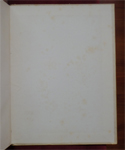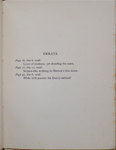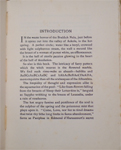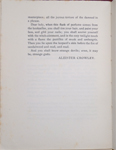100th
MP

|
THE
100th
MONKEY
PRESS |
|
|
|
Limited Editions by Aleister Crowley & Victor B. Neuburg |
|
Bibliographies |
|
Download Texts
»
Aleister
Crowley
WANTED !!NEW!!
|
|
THE WHIRLPOOL (Introduction Only) |
|
|
|
Image Thumbnails |
||||||||||
|
Title: |
The Whirlpool. (Introduction Only) |
|
||||||||||
|
Author: |
Ethel Archer. |
|||||||||||
|
Variations: |
|
|||||||||||
|
Publisher: |
Wieland & Co., 3, Great James Street, Bedford Row, W.C.2 |
|||||||||||
|
Printer: |
Chiswick Press: Charles Whittingham and Co., Tooks Court, Chancery Lane, London.2 |
|||||||||||
|
Published At: |
London.1 |
|||||||||||
|
Date: |
1911.1 |
|||||||||||
|
Edition: |
1st Edition. |
|||||||||||
|
Pages: |
46 + 4 pages of advertisements.5 |
|||||||||||
|
Price: |
Priced at 1 shilling.4 |
|||||||||||
|
Remarks: |
The introduction to this book was written by Aleister Crowley. The illustration on the front cover was designed by Ethel Archer’s husband at the time, Eugene Wieland.3 Title page printed in red and black.2 |
|||||||||||
|
Pagination: |
|
|||||||||||
|
Contents: |
|
|||||||||||
|
Author’s Working Versions: |
|
|||||||||||
|
Other Known Editions: |
||||||||||||
|
Bibliographic Sources: |
|
|
||||||||||
|
Comments by Aleister Crowley: |
|
|||||||||||
|
Reviews: |
THE WHIRLPOOL. By ETHEL ARCHER. The Equinox. 1s. net. I can add nothing to the appreciation which I have written for preface to this volume, which all should read. ALEISTER CROWLEY. ______________________________
Look at the cover, and shudder! In this masterpiece of illustration dwells the very soul of the book,—the virgin emaciated with insatiable passion; the verminous, illicit night-bird of a prehistoric age (the only conceivable steed for such an one!); the turbid waters of imagery; the lurid sky to which tentacular arms appeal to loves too luscious for this world, are all embodied in this simple design. The artist has seized the loathsome horror of the book,—I feared even to sign it. Look at the cover and shudder; then read it if you dare! E. J. WIELAND. ______________________________
The obsurer phases of love, the more mystic side of passion, have never been more enchantingly delineated than they are by Ether Archer, in this delightfully vicious book. Terrible in its naïveté, astounding in its revelations, “The Whirlpool” is the complete morbid expression of that infinite disease of the spirit spoken of in Thelema. For my own personal opinion I refer readers to my exquisite introductory sonnet to the volume. VICTOR. ______________________________
The first thing one wishes to know on completing this extraordinary volume is:—What is the author’s definition of Art? Some say that the definition of Art is to please; I say Art is artifice; Phil May said something which conveys nothing if translated into Latin, and is unprintable in English.
If the
author holds Phil Mar’s opinion she has, of course, every right
to continue printing such books; if, however, her idea of Art is
to please, then Ether Archer’s idea of pleasure is as warped as
her nature. BUNCO. ______________________________
Especially after a last glance at the wonderful cover, I think
that The World’s Pool of Sound suggests itself as an alternative
title to this thin volume. Thin but bony—nor could sweeter
marrow be found elsewhere. The volume has, I am afraid, an
unfortunate horoscope, owing no doubt to some affliction in
Virgo, with no correspondingly strong influence from the house
of Taurus. Let use leave it at that. ______________________________
Babes of the Abyss! behold Form without Soul! Of womanhood (philosophical Weininger-womanhood!) Ether Archer is the supreme expression. She is passion à rebours; Là-bas in excelsis. One can imagine her writhing away from even the infamies and hysterics of Canon Docre; or, having won her broomstick, declining to go to the Sabbath. Hers is the glass fruit of Murano, with its tinkling bells; hers that obscene chastity which blasphemes love and holds the candle to vice. Hers is the prudery and respectability which can pass through all fires unscorched, unwarmed. Hers is the soul of the real succuba, as that was before man idealised it away into a vampire of voluptuousness. Miss Archer (God help her!) is still young; her verse halts and her technique is faulty; it is amateurish. But she only needs a little hard work and experience to produce the vilest ravings that ever foamed upon the fleshless lips of a lost soul. Unless that work redeems her. For she is as idle as she is vicious. The book is a masterpiece of horror, in its way; every one should read it and shudder. LAURA GRAHAME. ______________________________
HONI SOIT QUI MAL Y PENSE! ETHEL ARCHER. —The above reviews are from The Equinox, Volume I, Number V, March 1911. ______________________________
On the cover a naked girl is riding a bat over a whirlpool; craggy white mountains are behind her and a red sky behind all. There is fine fierceness of movement in the design; it is certainly good. Mr. Aleister Crowley introduces Miss Archer briefly but splendidly, with phrases of this sort: "We find such rime-webs as abaaab-babbba and AsBCcAaBCcAaBC and bAbAcBcBAcCDaADA, more exquisite than all the arabesques of the Alhambra." Then Miss Archer dedicates her volume . . . "to that secluded little world of white which gather round
"THE EQUINOX"
. . . . O communication of Nuit, Thoth, and Hathor, accept these poems," . . .
Next V.B.N. once more introduced Miss Archer with a sonnet:
. . . Ah! Sappho! thou art born on earth again!
(On page 28 Miss Archer responds with a sonnet to V.B.N.) It is all very splendid. We are left in no doubt as top the mutual admiration of those who inhabit the "secluded little world of white." We feel drearily sensible of our outer darkness. Coming to Miss Archer's poetry we are obliged to notice her debt to Swinburne, yet we find it, on the whole, good—if not so good as Mr. Crowley and V.B.N. would have us believe. The colour is very strong; the shades of thought are clear, and often subtle. She sometimes indulges in the affectation of capitals to all her substantives: "Unhallowed Imagery of Man's Despair"; but not in the unreasonable way of many verse-writers. The uninitiated may certainly recognize great strength of conviction in Miss Archer, even if they cannot, or do not wish, to appreciate it. —The Poetry Review, H.M., 1912.
|
|||||||||||
|
|












